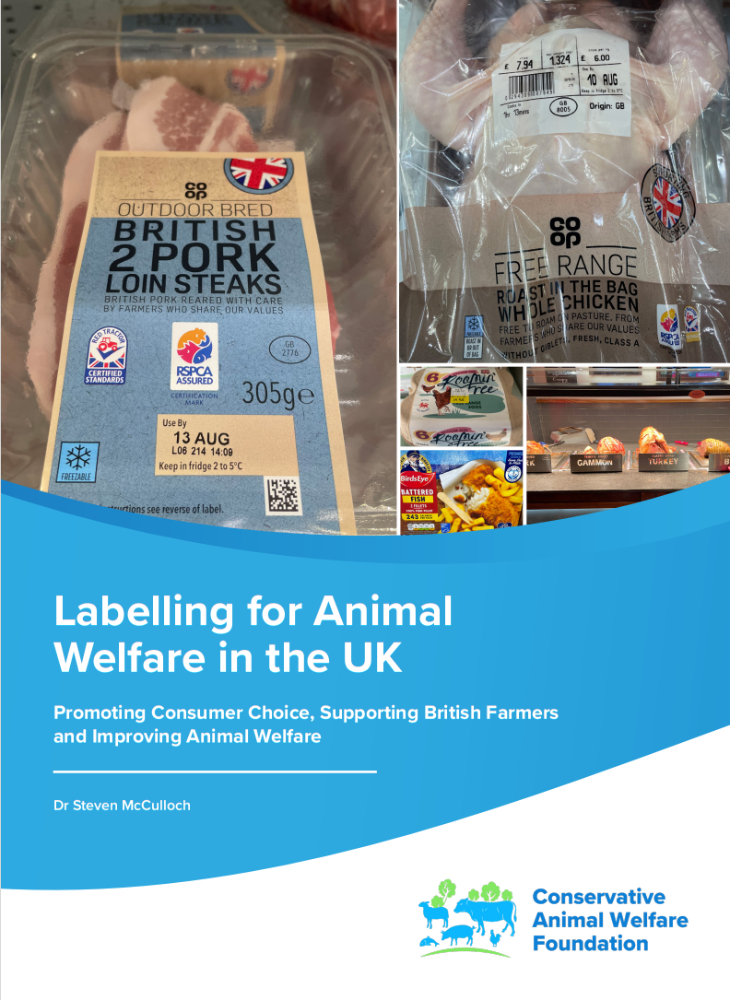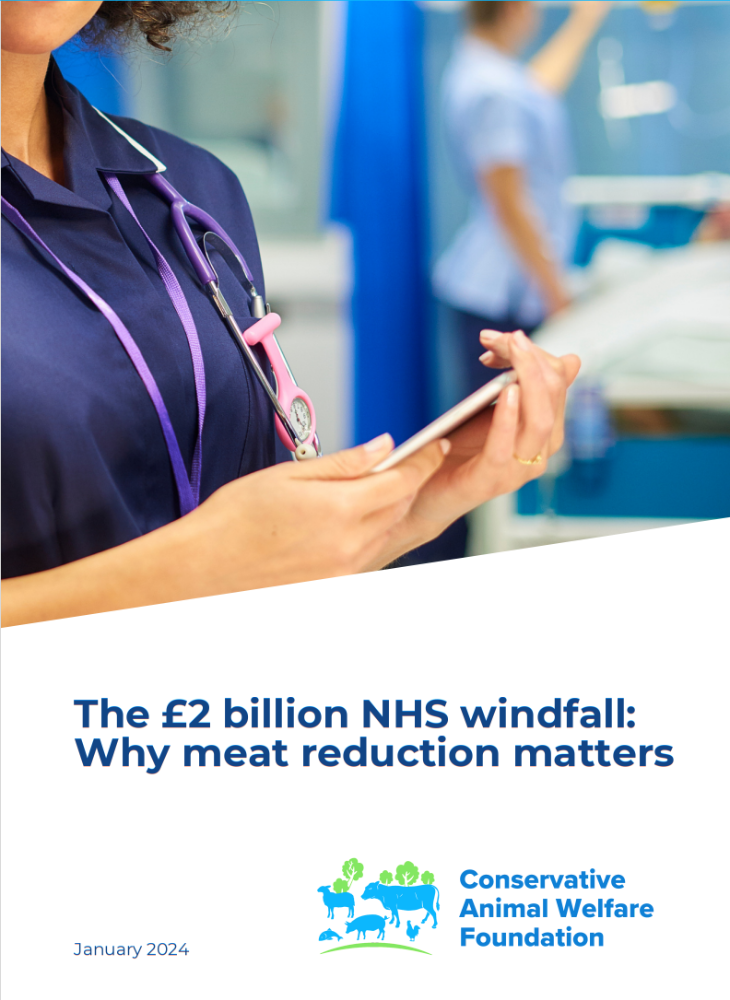The Hidden Harms of Factory Farms: How They Cost Taxpayers Millions
Livestock farming in the United Kingdom is very different from a few short
decades ago. Today, most livestock are consolidated into large factory
farms, which have replaced small family farms, especially for pigs and
poultry. Although the rise of the factory farm was supposed to make meat
cheaper for consumers, it has instead imposed significant costs on society.

Labelling for Animal Welfare in the UK
Conservative Animal Welfare Foundation’s new report, ‘Labelling for Animal Welfare in the UK’, which makes the case for mandatory animal welfare labelling to be implemented in the UK.

The £2 billion NHS windfall: Why meat reduction matters
This report published by Conservative Animal Welfare Foundation on 27th January 2024 aims to educate both policymakers and the public alike on the personal and societal benefits to eating even a fraction less meat. In this way we hope individuals can be free to make informed choices about their diets.
CAWF Pet Abduction Bill briefing
The Conservative Animal Welfare Foundation briefing on Patron Anna Firth MP’s Private Members Bill, the Pet Abduction Bill.
Another year, another COP – yet the question remains: Will industrial animal agriculture and food be swept under the carpet once again?
Conservative Animal Welfare Foundation blog ahead of the COP28 Summit, urging delegates in the UAE to commit to immediate global action towards creating sustainable, healthy food systems for the benefit of animals, people and the planet.
Why Manifestos Matter
At the Conservative Animal Welfare Foundation, we believe strongly in our manifesto proposals. Our years of experience in this area and our professional expert networks help us shape our policy asks. We know that animals matter to voters (our recent polling showed that two thirds, 64%, would feel more positively about a political party if they included a strong commitment to animal protection), we now call on the Conservative Party to show that animals do really matter to them too by including our asks in their General Election Manifesto.
Factory Farming: The Reality for Local Communities
This resource by Conservative Animal Welfare Foundation is designed to educate policymakers, local councils, and the public at large about the dangers of factory farming and why they should oppose their developments.
Farm Animal Welfare in the UK: What Does the British Public Want?
Conservative Animal Welfare Foundation report by Dr Steven McCulloch documenting the significant gap between what the British public demands as citizens and consumers, and the realities of what they receive via UK farming industry methods of production and practices.
Conservative Animal Welfare Foundation 2024 Manifesto: Leading the Way for Animals
The Conservative Animal Welfare Foundation 2024 Manifesto sets out its key policy recommendations for the Conservative Party to adopt in their 2024 General Election Manifesto. The Manifesto includes exclusive polling commissioned by Conservative Animal Welfare Foundation and carried out by Opinium in June 2023. The polling shows strong public support for political parties who legislate to enhance the lives of animals, and the extent to which the public values animal welfare as a consideration when casting their vote.
The Retained EU Law (Revocation and Reform) Bill and its impact on laws relating to farmed animals
The Conservative Animal Welfare Foundation commissioned Advocates for Animals law firm
to consider the impact of the Retained EU Law (Revocation and Reform) Bill (“REUL Bill”) on
farmed animal welfare legislation.
Animal Aid’s briefing on banning snares in the UK
Ahead of the parliamentary debate on 9th January, we are publishing Animal Aid’s briefing document on ending the use of cruel snares in the UK.
‘Animals Can’t Vote…But You Can!’
Book by former MEP, Vice President European Parliament Animal Welfare Intergroup, and Conservative Animal Welfare Foundation Patron John Flack.
Wild Fish Welfare in UK Commercial Sea Fisheries: Qualitative Analysis of Stakeholder Views
Conservative Animal Welfare Foundation Head of Research Dr Steven McCulloch has co-authored a paper with John Garratt on wild fish welfare in UK commercial sea fisheries, who has a professional background in the navy and in the civil service.
Conservative Animal Welfare Foundation – A little bit about us
The Conservative Animal Welfare Foundation is an independent organisation which
seeks to advance farm animal welfare and the lives of animals in the UK and around the
world. Our small but impactful team is made up of leading experts in the field of animal
welfare, research, politics and public affairs
Expansive, diverse habitats are vital for the welfare of elephants in captivity
After two decades of scientific and government scrutiny, Defra is reviewing the future of elephant-keeping in the
UK. At this juncture, the government is urged to take decisive action.
Banning Farrowing Crates – Transitioning to free farrowing to meet the welfare needs of pigs
Farrowing crates cause the greatest degree of confinement of farmed animals of any system
in the UK and European Union. The crate measures approximately 198cm x 60cm x 60cm
with a footfall (area) of 1.23m².1 This means that the sow is able to stand up and lie down,
but is unable to turn around or move freely to explore her environment. In the UK, 60% of
breeding sows are kept in crates, meaning over 200,000 sows are confined in this way
The Legal Protection of Farmed Fish vs Terrestrial Farmed Animals
Conservative Animal Welfare Foundation Briefing Document: The Legal Protection of Farmed Fish vs Terrestrial Farmed Animals:
What are the anomalies and how can they be addressed?
Cleaner Fish
Lumpfish and wrasse species are remarkable animals with unique personalities and the ability for tool use. They even show some evidence of self-awareness. Relying on their
natural (yet, opportunistic) ‘cleaning’ behaviour, the aquaculture industry uses millions of them (about 15 million produced in Scotland in 2020) to eat sea lice from farmed salmon. The industry refers to them as ‘cleaner fish’, hiding their rights as individual sentient beings.
CAWF – The Case for Ending Beak Trimming
Feather pecking and cannibalism constitute the greatest economic and welfare pressures to poultry production today. The current response to this ongoing issue is beak trimming.
The Case for Regular Inspections & Mandatory CCTV in Fish Slaughterhouses Report
76% of people in the UK believe the welfare of fish should be safeguarded to the same extent as other farmed animals
The Unpalatable Truth – CAWF Report on Industrial Animal Agriculture and Climate Change
This report demonstrates how large-scale industrial animal agriculture cannot remain at the current levels in the UK and still meet environmental targets.
GeneWatch UK Briefing: On-Target Effects of Genome Editing Techniques
This brief by GeneWatch UK highlights many questions regarding the mechanistic underpinnings of DNA repair pathways in the genome editing process, and how this may impact the safety and efficacy of genome-edited organisms.
The Welfare of Farmed Fish at the Time of Killing
Fish farming is the fastest growing food sector in the world, and the UK faces a unique time-sensitive opportunity to shape that growth.
DEFRA: Welfare of Animals at Time of Killing
Department for Environment Food & Rural Affairs, post implementation review of regulations on the welfare of animals at the time of killing.
CAWF: Crustacean Sentience Briefing
This report concludes that there is sufficiently strong evidence to conclude that both crustaceans and cephalopods are sentient.
CAWF: Fish Sentience Briefing
“There is as much evidence that fish feel pain and suffer as there is for birds and mammals”
– Victoria Braithwaite, Author of “Do Fish Feel Pain?”
Gene Editing Consultation: Defra Submission
Conservative Animal Welfare Foundation’s submission to Defra on why we oppose GMOs.
CAWF: Fish Welfare Report
The UK was one of the first countries to enact animal welfare legislation, however, fish have typically been left out of this progress.
CAWF: Ending Live Animal Exports
We recommend a complete ban on live animal exports. This would ensure they are slaughtered & raised according to UK’s welfare standards.
The Economics of Biodiversity
The review shows by bringing economics and ecology together, we can help save the natural world at what may be the last minute.
CAWF: Ending Farrowing Crates Research Report
Use of and interest in alternative systems to farrowing crates has been growing over the last decade, which is explored in this report.
CAWF: Mandatory Labelling Research Report 2020
As trends in ethical consumerism continue to rise, information about production and slaughter methods becomes increasingly necessary.
CAWF: Banning Cages for Laying Hens Research Report
We discuss the ways in a ban on caged systems for laying hens would impact three major groups: the British public, the hens & producers.
FAWC: Opinion on the Welfare of Animals during Transport
FAWC have identified a number of welfare impacts which animals may experience when they are transported, detailed in this short report to the Government.
The Agriculture Bill 2019-21
The Bill provides the legislative framework for replacement agricultural support schemes following leaving the EU.
Charter for a Caring Food Policy
Charter for a caring food policy that nourishes our health, the environment and animal welfare.
Brexit Trade in Food: Written Evidence Submitted by CAWF (BRT0015)
Our report details our recommendations for the new trade agreements for agricultural land use and food policy.
CAWF Brexit March 2017
It is important to ensure that animal welfare is not compromised as part of the process to leave the EU and that opportunities are taken to improve existing policies and standards.
Blueprint for agricultural land use and food production in the UK
Farmwel is working to generate momentum towards sustainable and accountable mainstream agriculture and aquaculture, focussing on the environment, people’s livelihoods, and farm animal welfare.
Climate Emergency Policy Briefing – Vegan Society
What individual and collective actions relating to food and farming can we take, to hit our crucial climate targets?
CAWF Manifesto on Animal Welfare
The UK is a nation of animal lovers. And our Party has a proud record of standing up for animal welfare.
End Live Exports For Slaughter and Fattening briefing
As the UK has left the EU we are no longer be bound by the EU’s free trade rules, we call for the Government to ban the live export trade for slaughter and fattening which over the years has caused immense suffering to our animals.


